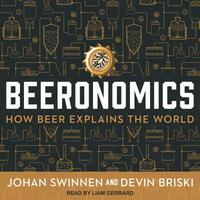Take a photo of a barcode or cover
Drier than expected for a book on the economics of beer.
I liked it. The transformation of brewing during the industrial revolutions, the incredible market concentration in America followed but the ABA INBEV takeover and micro brew revolution were my favorite parts. I was also interested in global drinking habits. Who knew the Russians were drinking much more beer and much less vodka?
It's biggest failing is being a little repetitive. It seemed that every time a previously introduced subject came up the authors included an unnecessary amount of backstory. It felt like about 10-20% of the content was repetition. That isn't terrible, but it was irritating.
I liked it. The transformation of brewing during the industrial revolutions, the incredible market concentration in America followed but the ABA INBEV takeover and micro brew revolution were my favorite parts. I was also interested in global drinking habits. Who knew the Russians were drinking much more beer and much less vodka?
It's biggest failing is being a little repetitive. It seemed that every time a previously introduced subject came up the authors included an unnecessary amount of backstory. It felt like about 10-20% of the content was repetition. That isn't terrible, but it was irritating.
Understanding the importance of beer throughout history makes sense of so many things.
informative
medium-paced
informative
slow-paced
As an avid lover (but a very modest drinker) of beer, literature that explores the history of the special liquid and its transformation down the ages has always fascinated me. Beeronomics is one of the more recent entries into that genre and a decent addition too. Beeronomics charts an insightful (albeit dry) journey of the history of beer production from ancient Egypt through the monasteries of Europe in the 17th and 18th centuries to the modern-day craft breweries in America and Europe.
The uniqueness of Beeronomics is that it explores the history of beer through an economics lens. From the taxes raised on beer and wine as a critical component finances Britain used to persecute the wars of 1689 to 1815. The high custom duties imposed on French wines made drinking locally brewed British beers a patriotic duty. The impact of globalization in the recent history of beer is seen in the rise of beer behemoths like AB InBev and SABMiller in a world where mergers and acquisitions have no respect for geographical boundaries and where global brands like Stella Artois are more popular overseas than at home. A similar story can be found in Australia where Foster’s is the export brand while Victoria Bitter is the domestic darling; Germany exports Beck’s, which trails domestically as the fourth biggest lager. The marketing and branding anecdotes of these global brands explain these seeming mismatches. Another interesting exploration in Beeronomics is how globalization has played a subtle part in Russia retaining an image as a vodka drinking nation while more beer is being drunk there in recent decades. Trade liberalisation, FDIs and global advertising audiences have had an obvious impact on the changing alcohol palates in many countries with Russia a prime example.
While Beeronomics does not deliver on how beer explains the world, it provides a rich (often dry though) history of how this precious liquid has transversed history, been impacted by global socio-economic trends while quenching global thirsts.
http://pagesandsounds.com/2021/01/3-beernomics/
http://pagesandsounds.com/2021/01/3-beernomics/
I read this one for a course I took. The writing was a little hard to get into.

